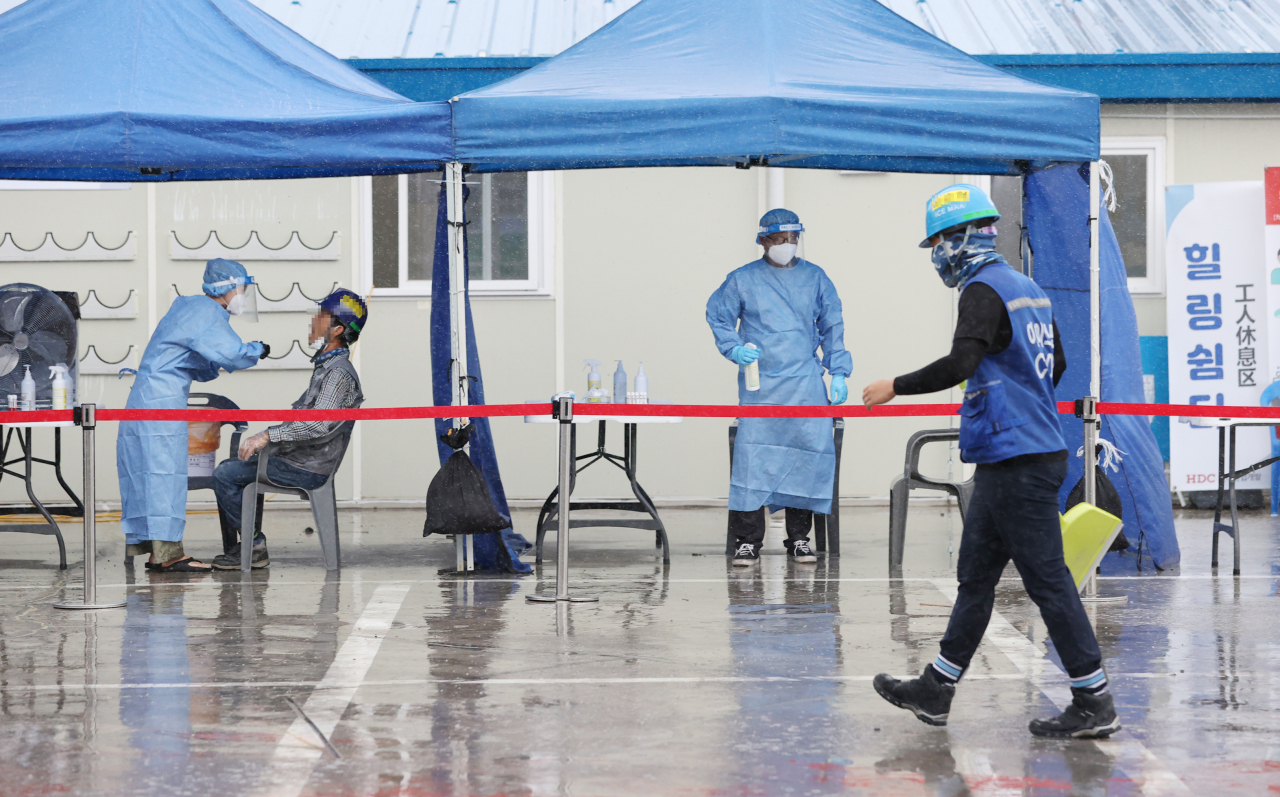New cases spike to over 2,000 again, infections in Seoul at record high

South Korea's daily new coronavirus cases spiked to over 2,000 again Wednesday, as the Seoul metropolitan area reported a record high daily caseload since the pandemic began amid growing concerns over untraceable and variant cases.
The country added 2,155 more COVID-19 cases, including 2,114 local infections, from the previous day, raising the total caseload to 241,439, according to the Korea Disease Control and Prevention Agency.
The latest tally marked a sharp rise from 1,418 cases Monday and 1,509 cases Tuesday. The number of patients normally falls over the weekend and rises later in the week as more people get tested.
Daily cases have stayed above 1,000 for a whopping 50 consecutive days. On Aug. 11, the country reported a record daily caseload of 2,222.
South Korea added nine additional COVID-19 deaths, raising the death toll to 2,237. The fatality rate came to 0.93 percent.
Health authorities and local governments said later that 1,519 new cases were confirmed as of 6 p.m. Wednesday, 131 fewer that at the same time the previous day. The KDCA compiles data on additional cases through midnight and announces the daily tally the following morning.
Of the newly confirmed domestic cases, 673 were from Seoul, the highest since the pandemic began last year. The city's surrounding Gyeonggi Province accounted for 579, and 117 were from the western port city of Incheon.
Cases piled up in other areas as well, with the southeastern port city of Busan adding 86 cases, and Daegu, 302 kilometers southeast of Seoul, reporting 99 infections. South Gyeongsang Province confirmed 102 new cases.
Authorities said sporadic cluster infections, coupled with untraceable cases, are putting the country's antivirus fight on edge. The highly contagious delta-driven infections also have complicated the antivirus efforts.
Over the past week, the country reported 3,062 COVID-19 variant cases, with 99 percent of them being the delta strain.
The wider Seoul area, where half of the nation's 52 million population lives, has been under Level 4 restrictions, the highest of the four-tier virus curbs, for the past six weeks.
Other areas have implemented Level 3 distancing for the last four weeks, although some areas, including the southern resort island of Jeju, have adopted the highest level of virus restrictions. The current social distancing measures will be effective until Sept. 5.
Health authorities added more curbs in the capital area this week, allowing restaurants and cafes to have dine-in customers only until 9 p.m., an hour earlier than the previous curfew.
Gatherings of more than five people are banned under Level 4, with the ceiling being lowered to just two after 6 p.m.
South Korea said the current level of infections are within a manageable level for the country's medical infrastructure, although daily cases above 2,500 may cause some issues in the longer run.
The number of patients with serious symptoms across the country reached 434, up 14 from the previous day.
As of Wednesday, 26.7 million people, or 52 percent of the population, have received their first shots of COVID-19 vaccines.
Around 25.1 percent have been fully vaccinated, the KDCA said.
An additional batch of 1.59 million doses of Pfizer's vaccine will be supplied here on Wednesday, authorities added.
So far, 159,775 cases of post-vaccination side effects have been reported, though 95 percent of them were found to be mild symptoms, such as muscle pain and fever. There have been 502 deaths following vaccination.
The government aims to vaccinate at least 70 percent of the nation's population by September to create herd immunity in November.
To brace for a possible spread of the virus over the Chuseok holiday, which falls in mid-September, authorities said it will request railway operators to sell window seats only for the time being, although it may lift restrictions later depending on the situation.
Millions of people normally travel across the nation over the Korean equivalent of Thanksgiving.
Over the past two weeks, around 33 percent of the newly added patients had unknown transmission routes. Cluster infections accounted for 13.1 percent.
Imported cases, which includes South Korean nationals, came to 41.
By country, the United States accounted for five, followed by Turkey and Tajikistan with four each.
The total number of people released from quarantine after making full recoveries was 211,177, up 1,984 from the previous day.
This indicates 87.5 percent of the patients reported here being cured.
South Korea has carried out 12,806,613 COVID-19 tests so far, including 56,857 from the previous day. (Yonhap)
本文地址:http://r.zzzogryeb.bond/html/03e699416.html
版权声明
本文仅代表作者观点,不代表本站立场。
本文系作者授权发表,未经许可,不得转载。